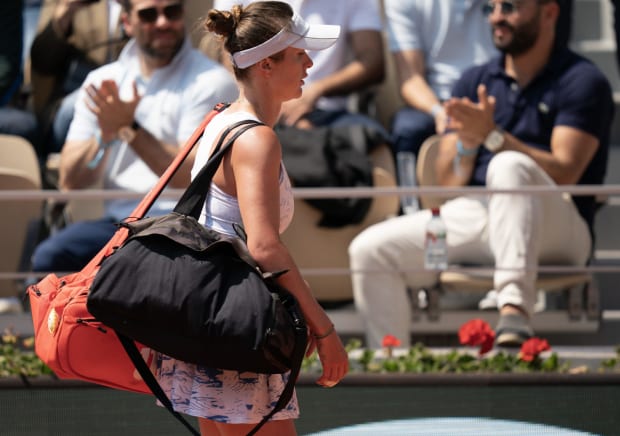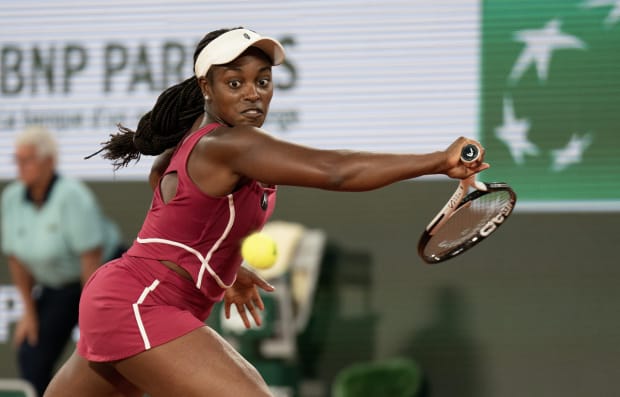As it is written, Wednesday is mailbag day …
Hope your report card reflects the following: D for Bouzková & Sorribes Tormo for unsportsmanlike conduct, C- for crowd booing Kasatkina despite thumbs up exchange with Svitolina, C for no free subscription required television coverage for US audiences of Sloane Stephens–Sabalenka match.
AK, Baltimore
• It would be gentlemanly to grade so low. Helicoptering parents might respond angrily.
But your points are well taken.
1. Inasmuch as it is true—and there are conflicting accounts—it is exceedingly pathetic for a team to lobby for another team’s disqualification. Especially if they did not see the allegedly offending act, which appears to be the case here. Disqualification doesn’t just mean defeat. It means that the team loses ALL their prize money and points. This was, at best, sorely lacking in collegiality.
2. If you know anything at all about Daria Kasatkina and her courage, you know she deserved a prolonged standing ovation. My suspicion: The crowd wanted a handshake. When they didn’t see it, they assumed—wrongly, of course—that Kasatkina was acting like a sore loser.
3. Tennis makes fans work so hard to be fans. Which, of course, is terrible for business. Tennis Channel broadcasts matches during the middle of the weekend but hands the last match off to NBC. NBC shunted tennis off the streaming Peacock. And fans, as usual, lose out.
As long as we are grading harshly: How about a D for tennis for not using replay? Technology is such that we are phasing out human beings for AI. And yet we don’t have video to review double bounces and whether benignly tapped balls warrant disqualification?
Hey Jon - Nole is using a patch for a performance boost and claims he wouldn’t be here without it? And the webpage of the patch says it nourishes the body with wavelengths of therapeutic light? Once again - hah?
Deepak (New York)
• Zava has left AFC Richmond and joined the Novak Djokovic team. Seriously, I have no problem here. I suspect the benefit is as much psychological as it is the advantages that accrue to the athlete who maximizes therapeutic light. Djokovic is, as Andre Agassi put it, “a seeker.” All of this curiosity is in service of his tennis. Is there a fine line between cutting-edge technology and pseudoscience? Yes. Is all of this in service of maximizing performance? Yes. Does Djokovic maximize? Yes.
I’d love to see a grade for (1) the RG crowd booing at weird times and (2) sportsmanship (double bounces, DQs). Seems like there are some things happening here.
@iamjwb5
• Agree and agree. The crowds here are famously fond of getting involved—which is great—but the “read the room” factor has been off this time around. The first day of the tournament, they booed a Ukrainian player (Marta Kostyuk) for not shaking Aryna Sabalenka’s hand. A week later, they booed a Russian player (Kasatkina) for not getting her hand shaken.
As for sportsmanship, I don’t get it. Quite apart from the reflexive “do the right thing,” wouldn’t you want to concede the point for practical reasons? There were nearly 400 points played Monday. Conceding one of them—again, a point you should have lost anyway—barely impacts the match and buys you good will. Taking the low road only brings on reputational damage. As long as we are here, give Francisco Cerúndolo some credit for this. And note Andy Murray’s reaction.
Hi Jon,
Kasatkina has spoken out against the war, which is what I thought Ukrainians like Svitolina and Kostyuk wanted, yet Svitolina doesn’t shake Kasatkina’s hand after their match? Miss me with that b.s.
Hey Elina and Marta - there’s nothing stopping y’all from going to fight for your country like lots of your countrymen and women are doing. Instead you complain about your tennis peers who have no control over the situation and aren’t involved in politics.
Chris, Austin, Texas
• These players are watching their homeland being turned to rubble, while progress is being turned back a century. They are uncertain about the safety of their friends and family. Their peers are being drafted. All because of an unstable autocrat. I’m not sure how they come in for criticism. If Ukrainian players don’t want to shake the hands of players representing the country making their lives hell, who are we to criticize, much less call b.s. But …

Susan Mullane/USA TODAY Sports
While fully respecting Elina Svitolina’s decision, what if she HAD shaken Kasatkina’s hand? Asked about it, she could have responded, “She has openly condemned Putin. While technically she is Russian, she has been declared an enemy of the state. And she is unlikely ever to return. THAT is a player with whom I would like to undertake an act of solidarity.” Might that have sent a stronger (and more amplified) message than a declined handshake and thumbs-up sign?
I expect western media tennis journos to close ranks and defend each other, so perhaps this question is futile. But I think [some media members are] being hypocritical to say the least: when Novak Djokovic was disqualified, [media] defended the disqualification vigorously. But when the doubles pair got disqualified at the French, he has an entirely different reaction. Not a surprise because western media and BR in particular have always had a frosty, at times even hostile, view towards EU tennis stars and especially Novak Djokovic but I think this polar opposite reactions to the same incident is quite glaring IMO.
- VK
• Fair enough. I think you could make the case that a player slapping a ball that struck an official in the throat from a few yards away is different from a ball hit by a player from the other side of the net. Naturally this has ended up in the culture wars. It’s Asian bias. It’s Eastern Europe vs. EU bias. It’s gender bias. It’s tears bias. It’s pro-Federer bias. I would add that Stefanos Tsitsipas drilled a ball at Wimbledon that missed a fan by inches, struck waaay more forcefully than Miyu Kato’s drive. Yet he received no default because his ball hit a fan on the ricochet, not directly.
My overarching point: At some stage, we needed some common sense and subjectivity, reading the room, as it were. Here we have a doubles player (who’s earned barely $150,000 on the year, by the way) wafting a ball across the net that happened to clip a distracted ball girl. This rule is in place for a noble reason: to protect nonplayers from acts of aggression.
Jon, with the 2023 French Open more than half over, what would you say are the biggest upsets so far?
Jonathan, Mass.
• I’d have to say Barbora Krejčíková and Kateřina Siniaková, the best in the business, losing in doubles, their first defeat of 2023. That their vanquishers (Eri Hozumi and Ulrikke Eikeri, the rare Norwegian–Japanese mash-up) promptly lost (to Bouzková and Sara Sorribes Tormo, no less), only makes this upset more jarring.
Other upsets? Thiago Seyboth Wild beating No. 2 Daniil Medvedev. (A tennis player facing domestic allegations and accusations that he is pro-Nazi is an upset in its own right.) What about Peyton Stearns, recent NCAA champ, playing fearless tennis and taking out former champ Jeļena Ostapenko?
In 2017, it looked like Sloane Stephens and Madison Keys had a big career ahead of them. Stephens beat Keys in the 2017 US Open final and made the French Open final in 2018. Keys did not make another Grand Slam final but has made the SF three times in Grand Slam tournaments since 2017. Keys lost in the 1st round and Stephens was beaten by Sabalenka in the 4th round in this year’s French Open. Why do you think the both of them have had such an up and down career since 2017? Has time passed by for possibly winning a Grand Slam title?
Bob Diepold, Charlotte NC

Susan Mullane/USA TODAY Sports
• You never say never. Stringing together 14 sets of tennis—getting a little help from the draw gods; finding full health; inflating confidence with each round—is always possible. Which is one of the beauties of tennis. Stephens, in particular, is coming off a Week 2 show at a major, fresh off of a dogfight with the No. 2 seed and winner of the previous major. But your larger point is well taken. Stephens and Keys are both lovely people worthy of emulation. Both have been something other than consistent. Both, like the rest of us, are getting no younger.
Hi, Jon,
A generally overlooked French Open story is that if Jessica Pegula and Coco Gauff win their next three matches and the French Open women’s doubles crown, Pegula will be the number one ranked women’s doubles player in the world, and Gauff #2. If Nicole Melichar-Martinez, Desirae Krawczyk and Taylor Townsend all win another match or two, they'll join them in the Top 10. Rajeev Ram and Austin Krajicek likely will end up in the top five in men’s doubles, and Taylor Fritz, Frances Tiafoe and Tommy Paul in the top 20 in men’s singles. I know a lot of fans focus on singles, but how long do you have to go back for this kind of broad success for Americans in tennis?
Thanks!
Rob
• Amen. As I write this, Taylor Townsend and Leylah Fernandez are getting it done as well.
I was very happy to see your social media post about Hyeon Chung’s recent challenger tour match against Andy Murray. Welcoming his return to singles tennis after such a long injury layoff prompted me to (1) reminisce about the most iconic tennis sports glasses worn since Karsten Braasch and (2) look up his memorable path to the 2018 Aussie semis.
While I recalled Chung’s huge upsets of Sasha Zverev and Djokovic (before losing to eventual champ Federer in the semis), I completely forgot that he also defeated a young Daniil Medvedev (!!!) in Round 2. It may not top Kevin Curren’s epic 1985 Wimbledon run to the finals over Edberg, McEnroe, and Connors (before losing to Becker)....but it certainly can't be that far behind in the drinking game pantheon of “most impressive grand slam runs (in hindsight) for an eventual non-champion” Welcome back and best of luck …
• Amen. The last player to beat Djokovic in Australia. Crass aside: It’s not the worst thing in the world for tennis to have an anchor in South Korea, an ascending country with a population north of 50 million.
Sweet little stat—Roger Federer won the last match he played at Roland Garros.
Helen of DC
• Amen. For those scoring at home, two years ago he essentially treated RG like a Wimbledon tune-up. He played, and won, three matches before pulling out.






